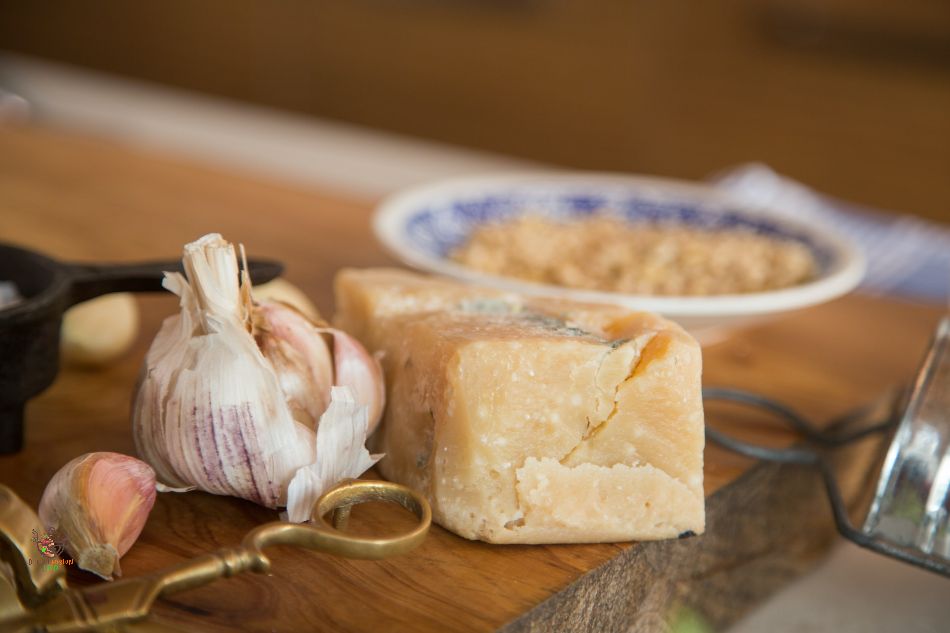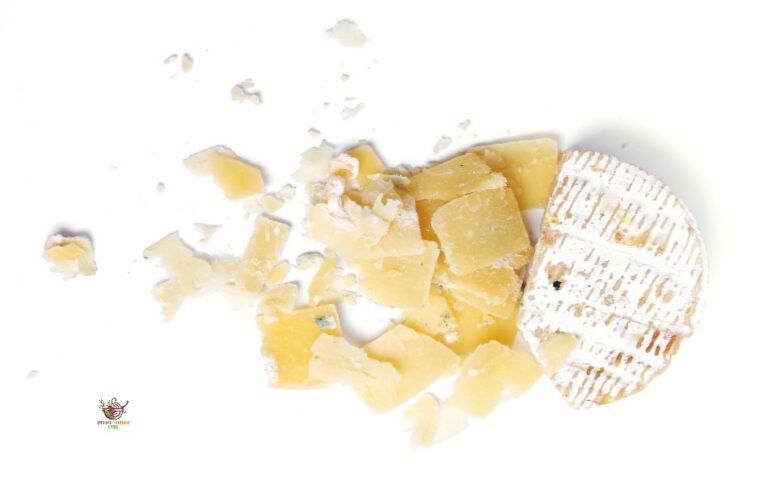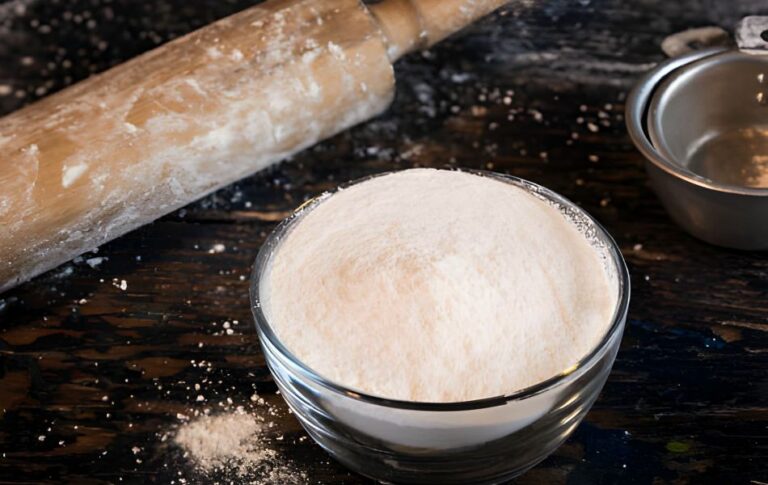Store Parmesan Cheese: Tips and Techniques
What is Parmesan Cheese?
Parmesan cheese is a tough cheese that comes from Italy. It’s made from cow’s milk without the creamy part and is left to age for a long time, usually at least two years, sometimes even longer. The Italian version is called Parmigiano-Reggiano. You can use Parmesan cheese in different dishes, like pasta, risotto, salads, and soups. It has a flavor that makes your food taste good.
How Parmesan Cheese is Made?
If you’ve ever savored the deliciousness of Parmesan cheese and wondered about its origins, here’s a glimpse into its production process. Parmesan cheese, known as Parmigiano-Reggiano, holds a special status and can only be crafted in a specific part of Northern Italy. It all starts with unpasteurized milk, heated in copper vats. To this milk, they add starter whey and calf rennet. From a vat of 1,100 liters of milk, they create two hefty 45-kilogram wheels of curds, which later become 38-kilogram wheels of cheese. The young cheeses take a bath in brine for about 25 days and then age for a full year, with weekly turning. Finally, the Parmigiano-Reggiano cheese consortium inspects each cheese to decide if it deserves the Parmesan seal.
Choosing the Perfect Parmesan Cheese

When choosing the perfect Parmesan cheese, whether grated or in a whole wheel, it’s essential to prioritize freshness and quality. Fresh Parmesan should have a pleasant, nutty aroma, a firm and crumbly texture, and a generally pale yellow or ivory color. Trust your senses to ensure you’re getting the best flavor and quality. Additionally, when reading labels and certifications, look for indications that the cheese is made in Italy and labels like “Parmigiano-Reggiano” or the Consorzio Tutela Parmigiano-Reggiano seal, which guarantee authenticity and quality. So, whether you prefer the convenience of grated cheese or the authentic experience of grating it yourself, focus on these freshness and certification factors to make the right choice.
Proper Storage Conditions
Properly storing Parmesan cheese requires careful consideration of temperature and humidity. To maintain its quality and flavor, keep Parmesan cheese between 35°F and 45°F (1.7°C and 7.2°C), making the refrigerator an ideal choice. However, control humidity levels as excessive moisture can lead to mold growth, while extreme dryness can cause the cheese to become brittle. To strike the right balance, store Parmesan cheese in airtight containers or tightly wrap it in wax paper to protect against moisture loss. If you’ve got a whole Parmesan cheese wheel, wrap it in wax or parchment paper, then cover it with aluminum foil. Avoid plastic wrap as it can trap moisture and lead to mold. Store the wrapped cheese in the warmest part of the fridge, often the cheese drawer or the top shelf.
Proper Storage and Duration for Parmesan Cheese at Room Temperature
Parmesan cheese can be stored at room temperature for up to 8 hours due to its lower moisture content and hard texture. However, extended exposure to room temperature may cause it to lose some freshness and flavor.
To store Parmesan cheese at room temperature, keep it in a cool, dry place away from direct sunlight and heat sources. Utilize a cheese dome or airtight container to shield it from moisture and potential contaminants. Wrapping it in cheese paper or wax paper allows it to breathe while providing protection. Regularly check the cheese for any signs of spoilage and discard if needed. For longer-lasting freshness, it’s advisable to refrigerate the cheese and take it out only when needed.
Parmesan Cheese Refrigerator Storage Tips
When storing Parmesan cheese in the refrigerator, remember these tips:
- Use an airtight container or wrap it in wax or parchment paper to keep out moisture and odors, preserving its flavor and texture.
- Keep it away from strong-smelling foods like onions and garlic, as Parmesan can absorb their odors.
- Store it in the warmest part of the fridge, like the cheese or deli drawer, for a consistent temperature.
For proper packaging, wrap it in wax or parchment paper, not plastic wrap, and then place it in an airtight container or resealable bag to protect it from odors and contamination.
To make your Parmesan last longer:
- Maintain the airtight packaging to prevent moisture and odors from affecting it.
- Avoid placing it near foods with strong odors.
- Regularly check for mold or spoilage and remove any affected parts promptly to prevent further issues. These steps will keep your Parmesan cheese fresh and delicious for longer.
Freezing Parmesan Cheese: What to Do and What to Avoid
When freezing Parmesan cheese, remember these tips:
- Wrap it tightly: Wrap the cheese tightly to keep its flavor using plastic wrap or airtight containers.
- Freeze it in whole pieces: Grated Parmesan may not freeze well, so freeze it as a block or wedge.
- Label with the date: Keep track of when you froze it for freshness.
To prepare Parmesan for freezing:
- Use solid blocks or wedges.
- Wrap it tightly in plastic wrap or foil to avoid air pockets.
- Place the wrapped cheese in a resealable freezer bag or airtight container.
- Label it with the date for freshness.
Thawing: Transfer frozen Parmesan cheese to the fridge for a gentle thaw overnight. Avoid room temperature thawing or using a microwave to preserve its texture and flavor. Enjoy the deliciousness once thawed!
Tips and Ideas for Reviving and Using Frozen Parmesan Cheese
Reviving
- Slowly thaw the cheese in the fridge to keep it moist.
- Wrap it tightly or store it in an airtight container to avoid exposure to air.
- If it’s dry, drizzle a bit of olive oil to bring back moisture.
Frozen Parmesan may not grate as well, but it’s perfect for melted or grated cheese recipes.
Using Frozen Cheese
There are plenty of tasty ways to use frozen Parmesan cheese:
- Grate and sprinkle it over pasta, soups, and salads for extra flavor.
- Use it for a cheesy breadcrumb topping on casseroles or baked veggies.
- Melt it on toasted bread or crackers for a quick snack.
- Add grated Parmesan to scrambled eggs or omelets for a cheesy twist.
Proper Handling and Care for Parmesan Cheese
Techniques for Cutting and Grating
- Use a sharp knife to cut the desired amount from the block.
- For grating, choose a microplane or fine grater for fluffy shavings.
- Grate it yourself for better flavor and a little arm workout, but watch out for your fingers!
Preserving Cheese Freshness and Avoiding Mold
- Keep hands and utensils clean to avoid contamination.
- Make sure the cheese is dry prior to storage.
- Wrap it in wax or parchment paper, not plastic wrap, and place it in an airtight container or resealable bag.
- Store it in the fridge at 35-40°F (1-4°C).
- If you see mold, discard the affected parts and rewrap the rest.
Maintaining Cheese Tools and Containers
- Wash cheese tools with warm soapy water after each use, using a brush or sponge.
- Avoid abrasive cleaners to prevent damage.
- Clean airtight containers thoroughly with hot water and mild detergent, removing all cheese remnants.
Understanding Shelf Life and Signs of Spoilage
Expiration Dates
- Parmesan cheese doesn’t technically expire but can lose flavor and texture over time.
- Expiration dates on packaging offer guidance on peak quality but aren’t strict.
- Proper storage matters for extending shelf life. If it looks and smells okay, it’s likely good even after the date.
Signs of Spoiled Cheese
Watch out for these signs of spoiled Parmesan:
- If it smells awful rather than nutty, it’s time to say goodbye.
- Some molds are okay to scrape off, but if it’s a science experiment gone wrong, toss it.
- Any odd colors like green or pink.
- If it feels gritty or slimy instead of crumbly, it’s spoiled.
Shelf Life Variations
- Shelf life varies based on aging, moisture content, and storage.
- Hard, aged Parmesan can last 1-2 years when stored properly, while softer, less-aged types may last a few months.
- Always check for spoilage signs before consuming, and enjoy your Parmesan at its best!
Creative Ways to Use and Store Parmesan Rinds
Using Parmesan Rinds
- Make Parmesan broth by simmering them with herbs and vegetables for soups, stews, or risottos.
- Infuse olive oil with rinds for nutty dressings and marinades.
- Grating the rinds over pasta or salads for an extra cheesy kick.
Storing Parmesan Rinds
- Wrap them tightly in plastic or position them in an airtight container.
- Keep them in the fridge; they can last for months and get even more flavorful with time.
Nutrition and Health Tips
Nutritional Value
A 1-ounce (28.35g) portion of firm Parmesan cheese offers a notable nutritional profile. It contains 111 calories, 10.1 grams of protein, and 7.09 grams of total fat. While its carbohydrate content is relatively low at 0.913 grams, Parmesan is a rich source of essential minerals, with 335 mg of calcium, 0.232 mg of iron, 12.5 mg of magnesium, 26.1 mg of phosphorus, and 26.1 mg of potassium. However, it’s important to note that Parmesan cheese is moderately high in sodium, providing 335 mg. Additionally, it contains 0.78 mg of zinc and various vitamins, including A, B12, B6, E, D, and K, making it a nutrient-dense addition to your diet.
Health Benefits
- Parmesan is rich in protein, calcium, and phosphorus for strong bones and teeth.
- It contains vitamin A for healthy vision and vitamin B12 for nerve function.
- Suitable for those with lactose intolerance due to its low lactose content.
Addressing Allergies and Dietary Limitations
Consider dairy allergies, as Parmesan is cow’s milk-based. Store it separately to avoid cross-contamination. If you’re vegan or lactose intolerant, explore plant-based Parmesan options. Prioritizing nutrition, health, portions, and dietary requirements ensures the safe enjoyment of Parmesan cheese for all.
See Also – Substitute for Blue Cheese: 11 Delicious Options to Try
Frequently Asked Questions
Is the rind of Parmesan cheese edible?
The rind is edible and adds flavor to soups and sauces. Just remove any wax or plastic coating.
How do I prevent mold on my Parmesan?
Store it in a cool, dry place. Wrap it in wax or parchment paper to breathe while protecting it from moisture.
How long does opened Parmesan cheese last?
Opened Parmesan cheese can last up to six months in the refrigerator.
Tips for using frozen Parmesan?
Grate while frozen to prevent clumping. Use in recipes that call for grated Parmesan.







